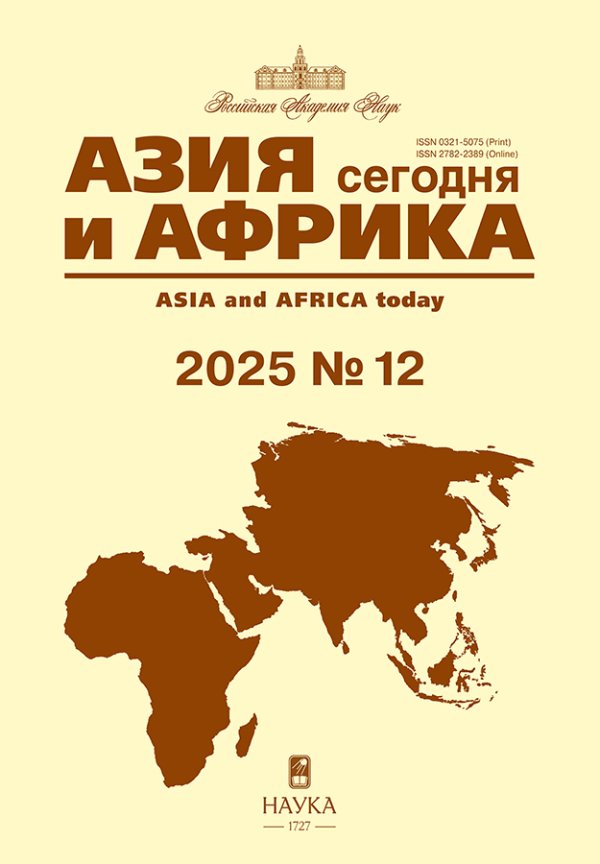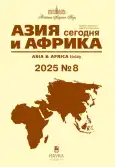Participation of Bandung Countries in the Formation of the Big Eurasian Partnership (to the 70th Anniversary of the Bandung Conference)
- Authors: Andreeva E.L1, Ratner A.V1, Zakharova V.V1
-
Affiliations:
- Institute of Economics, Ural Branch, Russian Academy of Sciences
- Issue: No 8 (2025)
- Pages: 5–13
- Section: Top problem
- URL: https://medbiosci.ru/0321-5075/article/view/307513
- DOI: https://doi.org/10.31857/S0321507525080019
- ID: 307513
Cite item
Abstract
About the authors
E. L Andreeva
Institute of Economics, Ural Branch, Russian Academy of Sciences
Email: andreeva.el@uiec.ru
Dr.Sc. (Economics), Professor, Head, Centre of Regional Comparative Studies Yekaterinburg, Russia
A. V Ratner
Institute of Economics, Ural Branch, Russian Academy of Sciences
Email: ratner.av@uiec.ru
PhD (Economics), Senior Re- searcher, Centre of Regional Comparative Studies Yekaterinburg, Russia
V. V Zakharova
Institute of Economics, Ural Branch, Russian Academy of Sciences
Email: zakharova.vv@uiec.ru
Junior Researcher, Centre of Regional Comparative Studies Yekaterinburg, Russia
References
- Efimova L.M., Khokhlova N.I. 2020. Conceptualisation of “Asian values” in Malaysia and Singapore. World Economy and International Relations. № 1. Pp. 91–98. (In Russ.). doi: 10.20542/0131-2227-2020-64-1-91-98
- Boyarkina A.V. 2008. Chinese authors about building a harmonious and sustainable world. Russia and the Pacific.№ 4. Pp. 170–179. (In Russ.)
- Portelli J., Campbell-Stephens R. 2009. Leading for equity: The investing in diversity approach. Toronto: Edphil Books. 74 p.
- Andreeva E.L., Ratner A.V. 2024. Assessing the Resource Provision: from the EAEU to the Greater Eurasian Space. Economy of Regions. № 1. Yekaterinburg. Pp. 263–275. (In Russ.). doi: 10.17059/ekon.reg.2024-1-18
- Karaganov S.A. 2022. From non-West to global majority. Russia in Global Affairs. № 5. Moscow. Pp. 6–18. (In Russ.). https://globalaffairs.ru/articles/ot-ne-zapada-k-bolshinstvu (accessed: 11.09.2024)
- Clifford A. Kiracofe. 2023. Pushing Back Against Propaganda. Beijing Review. № 33. Beijing. Pp. 28–29. DOI: CNKI:SUN:BJZB.0.2023-33-013
- Stewart P. et al. 2024. Reimagining Global Economic Governance: African and Global Perspectives. Report. Washington: Carnegie Endowment for International Peace. 1 Sept. 20 p. http://www.jstor.org/stable/resrep63080.10 (accessed 15.02.2025)
- Kapitsa L.M. 2018. South: The Road to Economic Independence. Economics: Yesterday, Today and Tomorrow. № 10А. Noginsk. Pp. 442–465. (In Russ.)
- Bogdanov K.V., Kobrinskaya I.Ya., Frumkin B.E. 2024. Race on the Global South, or Fight for Global Majority. Russia in Global Affairs. № 5. Moscow. Pp. 80–97. (In Russ.). doi: 10.31278/1810-6439-2024-22-5-80-97
- Mazyrin V.M. 2024. The EAEU – Vietnam Free Trade Agreement: Expectations and Reality. Outlines of Global Transformations: Politics, Economics, Law. № 3. Moscow. Pp. 128–148. (In Russ.). doi: 10.31249/kgt/2024.03.07
- Smirnov A.V., Kasavina N.A., Nikolsky S.A. (Eds.). 2023. Civilization: Polyphony of Meanings. Memoria. (Series “Humanitas”). Moscow, St Petersburg. 540 p. (In Russ.)
- Boytsov V.V. 2015. The spirit of Bandung and the Practice of Economic Cooperation in South-East Asia. Southeast Asia: Actual Problems of Development. № 26. Moscow. Pp. 18–25. (In Russ.)
- Drugov A.Yu. 2009. Russia – Indonesia: “inflows” and “outflows”. Asia and Africa today. № 12. Moscow. Pp. 5–12. (In Russ.)
- Safronova E.I. 2017. China and Developing Countries: History and Conceptual Basis of Relations (1949–2013) (the case of Africa and Latin America). Moscow, 130 p. (In Russ.)
- Ahmed Salem Al-Wahishi, Baklanov A.G. 2021. Ideas of Afro-Asian solidarity and the realities of the XXI century. Asia and Africa today. № 3. Moscow. Pp. 78–80. (In Russ.)
- Simoniya A.A. 2015. From Bandung conference to ASEAN chairmanship: Myanmar’s long way to restoration of active foreign policy. Southeast Asia: Actual Problems of Development. № 26. Moscow. С. 93–113. (In Russ.)
- Nuzhdin I.I., Dmitriev R.V. 2024. Regional Disproportions in Russian Exports of Agricultural Products to African Countries. Asia and Africa today. № 7. Moscow. Pp. 17–23. (In Russ.). doi: 10.31857/S032150750031388-8
- Velikaya A.A. 2024. Russia’s Humanitarian Policy in Southeast Asia. Pathways to Peace and Security. № 1. Moscow. Pp. 179–193. (In Russ.). doi: 10.20542/2307-1494-2024-1-179-193
Supplementary files











